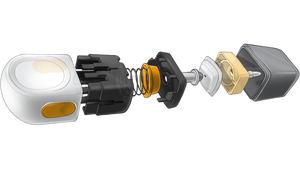Winning new markets with value-adding specialties
October 8, 1999
Röhrig High Tech Plastics AG (HTP-Neudörfl, Austria) is a custom molder and moldmaker that has put itself on a winning streak by parlaying its expertise in processing, materials, and product design into creating value-added solutions. HTP, with sales of Sch 380 million (US$ 29.1 million) in 1998, expects to reach Sch 470 million (US$ 35.5 million) this year. Sales reached Sch 270 million (US$ 20.4 million) in only the first six months of its 1999 fiscal, and that's without tallying in its expected winnings from what is shaping up to be a sales and marketing jackpot-smart casino chips.
HTP developed smart chips (Figure 1) and the integrated technologies to mass-produce them in-house for international casinos and for other security-sensitive industries. These smart chips allow casinos worldwide to monitor all their gambling tables simultaneously.
HTP not only designed the product, it also designed a proprietary plastic to mold them in, one that is as heavy as metal. It also engineered a manufacturing cell to insert mold the chips automatically. Using low-pressure backmolding, the smarter chips are also automatically labeled with printed foil.
This project illustrates a value-adding specialty HTP has honed to perfection. The company calls this specialty hybrid molding. It molds complex, high-precision technical parts combining plastic with some other material, usually metal. More than 500 million micron-tolerance parts are molded every year. In some cases, more than a million are run in a single day. Yet, overall, defect rates only range from 4 to 6 ppm.
Solution Engineers
High-tech insert molding is another value-adding specialty HTP provides its automotive, electronics, and lifestyles customers from around the world. It is single-sourced worldwide by Philips. Sony and Siemens are among other companies also exclusively availing themselves of HTP's insert molding expertise and reliability.
For example, HTP manufactures small laser lens carriers in a carbon-fiber-reinforced LCP (see Figure 2, inset). The lens carriers are used in popular optical media players and drives. HTP holds some of the part's tolerances to within 30 mm. What really makes this application special, though, is that the part is wire insert molded in eight-cavity molds run in lights-out cells.
The mold is the machine in these cells. It forwards the wire fed from 16 spools behind the press, bends the wire 180° into shape in each cavity, and cuts it (see Figure 2, opposite). Company sources estimate that any one of the six or so 80-ton molding machines the lens holders run in costs about US$ 100,000. They say that molds cost twice as much.
Cell secondaries also add to the cost. Yet, the cost has proven to be effective. Next-generation systems are already in the works with 16-cavity tooling and 32 wire spools. HTP insert molds precisely shaped metal inserts in fully automated cells just as effectively as it runs wire.
HTP runs 80 presses at its 50,000-sq-m plant in Austria and 70 more at a Slovakian plant. The company is considered the largest custom molder in Austria. Tonnage capacity ranges from 15 to 1000 tons. HTP also has up to 650 active molds.
The company performs progressive process, materials, and product R&D programs to find solutions that add the most value. Such solution engineering supports profitable long-term relationships with key accounts. The stakes up front for these solutions sometimes can be high, but HTP's specialties allow it to avoid having to gamble with price-sensitive markets, and help it to win.
You May Also Like


